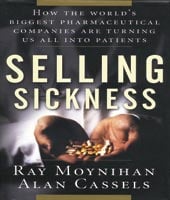Advertisement
Selling Sickness:
How the World's Biggest Pharmaceutical Companies Are Turning Us All into Patients

by Ray Moynihan and Alan Cassels
Greystone Books, 2005
254 pages
“With less than 5 percent of the world’s population, the United States and Canada make up almost 50 percent of the global market in prescription drugs,” write Australian health reporter Ray Moynihan and Canadian drug policy researcher Alan Cassels in their book, Selling Sickness.
“Spending in the US and Canada continues to rise more rapidly than anywhere else,” say the authors, “increasing by almost 100 percent in just six years–not only because of steep increases in the price of drugs, but [also] because doctors are simply prescribing more and more of them…Alternative ways of understanding or treating health problems are often swept away by a frenzy of drug company promotion.”
Some of the billions currently invested in expensive drugs might be far more efficiently spent on enhanced campaigns to reduce smoking, increase physical activity, and improve diet. It is a “perversion of prevention,” charge the authors, and the greatest threat to public health is the cozy relationship between the pharmaceutical industry and the doctors who diagnose illness.
“Under a voluntary code created by the industry, it remains acceptable for a drug company to fly 300 supposedly independent doctors to a golf resort, pay them to attend, and ‘educate’ them about the company’s latest drugs,” write Moynihan and Cassels.
What can we do? Increasingly, physicians and other medical professionals are choosing to remain independent of marketing enticements from pharmaceutical manufacturers. Leading the way is the American Medical Student Association, whose “Pharm-free” campaign urges medical students to say no to free lunches, gifts, and paid speaking engagements.
A compelling account of medical malfeasance, Selling Sickness cites numerous reputable medical experts, proving its thesis that doctors, the people we trust to offer untainted advice about powerful pills, have become part of the marketing campaigns for those very same pills–not just helping to sell the medicines, but “helping to sell a particular definition of disease that expands markets for those medicines.”
This accessible study by top medical journalists delivers a disconcerting expos?f the intricate connections between Big Pharma and the conventional medical establishment–a message alive readers will certainly recognize. The book is an insightful and informative read for those who support self-healing with safe and natural methods.




